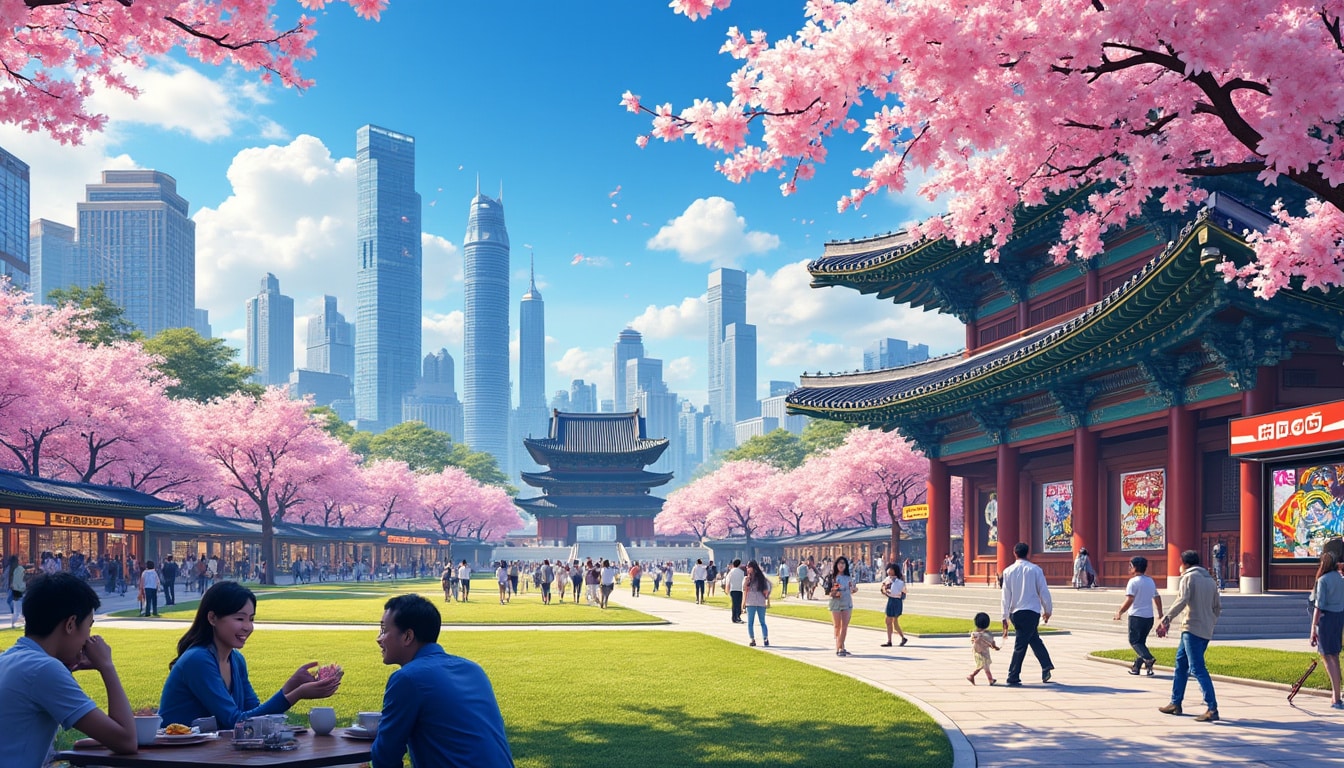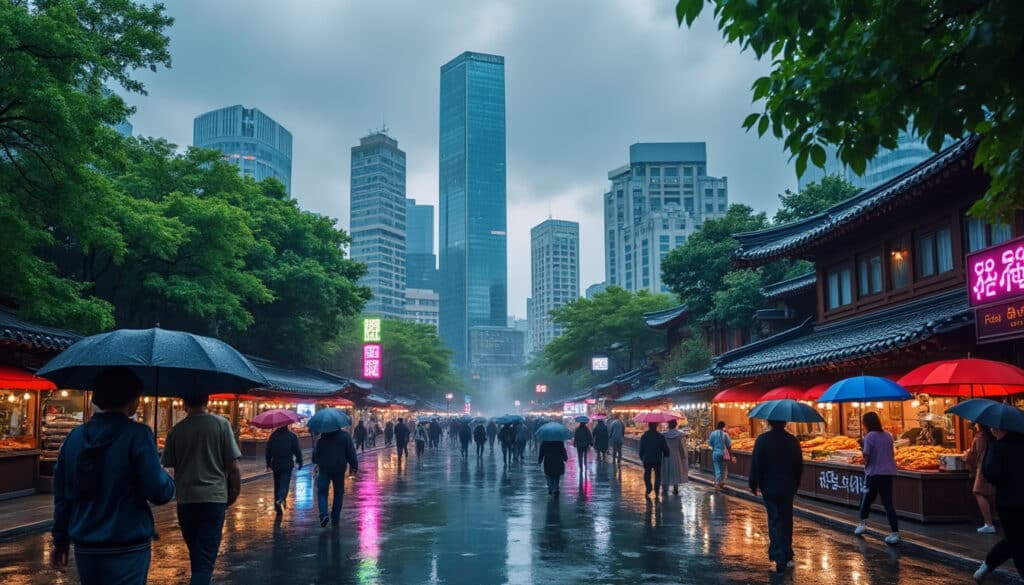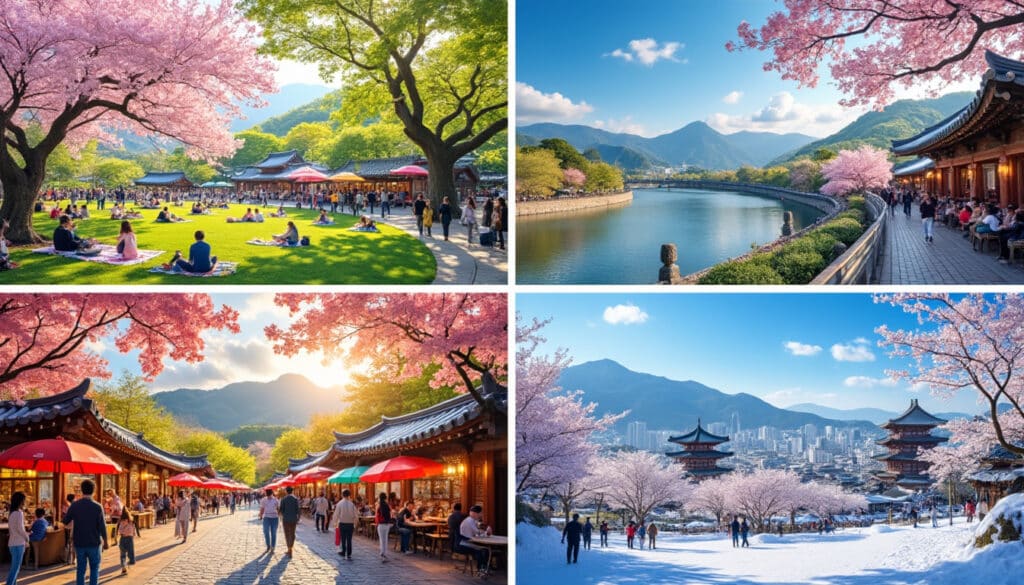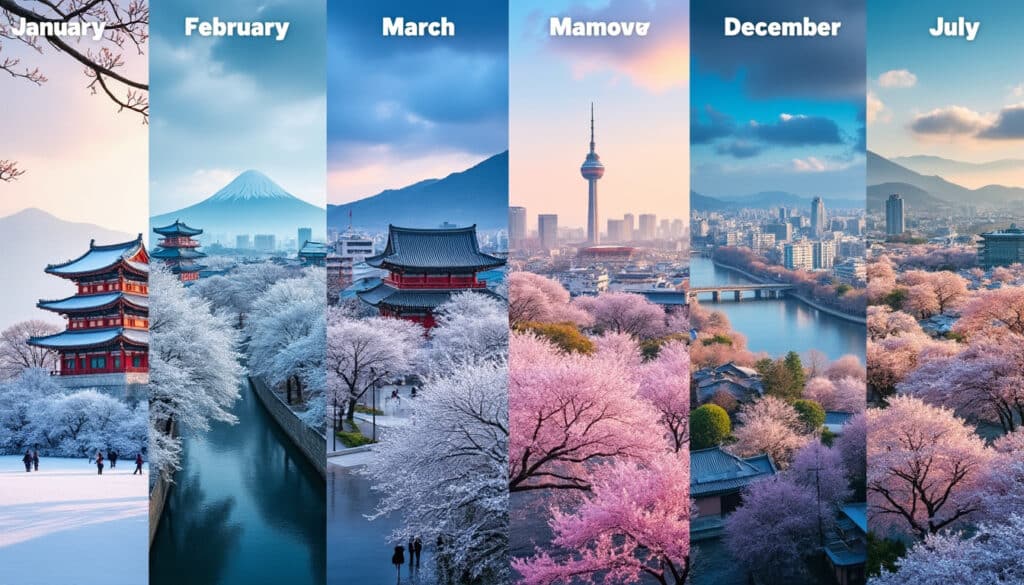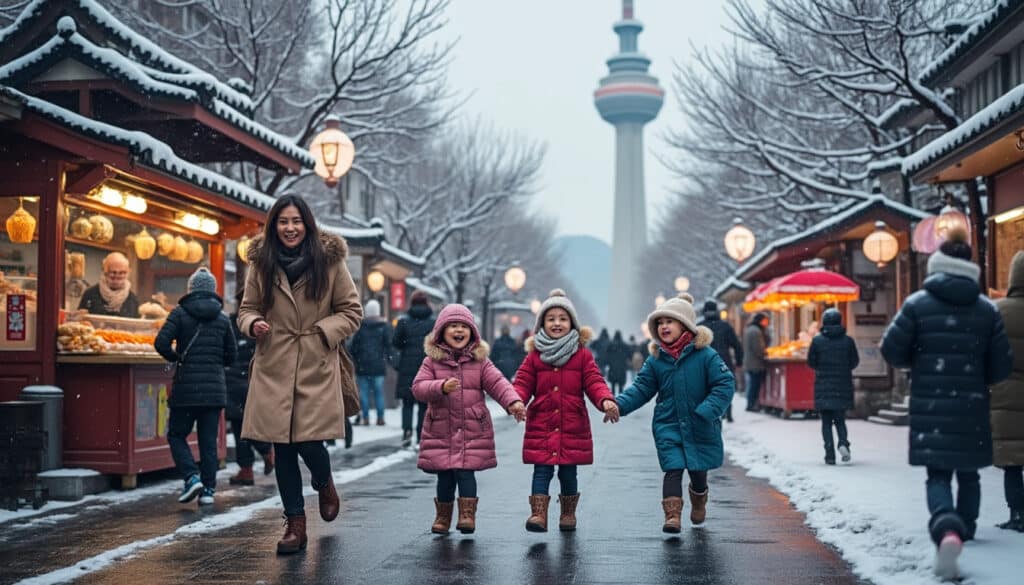Seoul, the bustling heart of South Korea, boasts a climate as vibrant and varied as its cultural landscape. Visitors and residents alike are treated to four distinct seasons, each bringing its own flavor to the city. From the icy chills of winter to the humid swelter of summer, Seoul’s weather patterns play a pivotal role in shaping the lifestyle and rhythm of this dynamic metropolis. Understanding these climatic nuances not only enhances the experience of living in or visiting Seoul but also aids in planning activities and adventures throughout the year.
Understanding Seoul’s Seasonal Climate
Seoul’s climate is a fascinating blend, predominantly classified as humid continental but with subtropical tendencies. The city’s climate can be broadly divided into four distinct seasons, each contributing to Seoul’s complex and captivating weather tapestry. This variety ensures that residents and visitors experience a wide range of weather conditions throughout the year.
One distinguishing feature of Seoul’s climate is its cold winters, influenced by Siberian winds that sweep through the city. January, the coldest month, sees temperatures dipping to an average low of -7°C and a high of 2°C, with the coldest days often marked by chilling winds. Snowfall is common, and the city can experience a picturesque winter landscape, albeit with the challenges of icy conditions.
Spring, arriving with much anticipation, breathes new life into the cityscape with blossoming flowers and milder temperatures. March marks the transition, where the chill of winter fades into more pleasant conditions, with temperatures ranging from 0°C to 11°C. This season, particularly in April, is ideal for exploring Seoul’s numerous parks and enjoying the Cherry Blossom Festival, a must-see for any traveler.
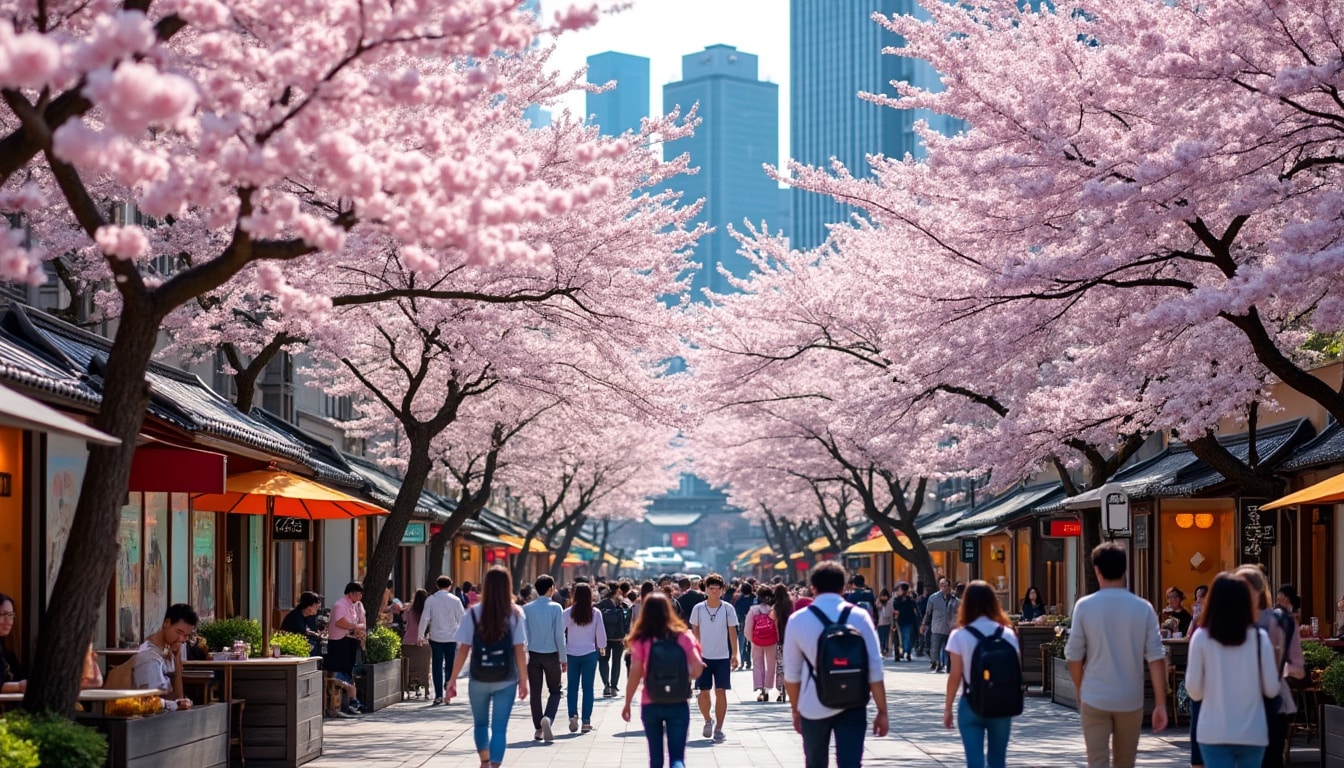
Summer in Seoul is notably hot and humid, characterized by the influence of the East Asian monsoon. June through August experience significant rainfall, with July and August recording the highest precipitation, averaging 144.5 mm and 154.8 mm respectively. The average maximum temperature climbs to about 30°C in August, making it the hottest month. These conditions can be stifling, yet they offer a unique opportunity to experience Seoul’s indoor attractions, such as its modern museums and bustling shopping districts.
Autumn, arguably Seoul’s most breathtaking season, paints the city in vivid hues of red and gold. September through November are characterized by cool, crisp air and clear skies. September can still be warm with temperatures around 26°C, but by November, the air cools to more comfortable highs averaging 12°C. This makes autumn an excellent time for trekking and outdoor activities, as the dense foliage of Seoul’s surrounding mountains turns to a stunning palette of fall colors.
Seoul’s four seasons each offer unique experiences and challenges. Whether it’s battling the summer’s monsoon rains or embracing the snowy charm of winter, those who live in or visit Seoul find themselves adapting to a variety of climatic conditions. This diverse climate makes Seoul an endlessly fascinating place to explore year-round.
Temperature and Precipitation Trends in Seoul
Throughout the year, temperatures in Seoul can fluctuate dramatically, an aspect that shapes the daily lives of its inhabitants. Monitoring these trends helps in planning better and enjoying everything this vibrant city has to offer. Here’s a look at how temperature and precipitation vary across Seoul’s seasons.
Seoul’s annual temperatures can vary from a freezing low of -7°C in January to a scorching high of 30°C in August. These temperatures create distinct seasonal experiences that are both challenging and enjoyable. Understanding these patterns is crucial for anyone planning their visit or daily life in the city.
Below is a detailed temperature and precipitation table for Seoul:
| Month | High Temp (°C) | Low Temp (°C) | Precipitation (mm) |
|---|---|---|---|
| January | 2 | -7 | 14.1 |
| February | 5 | -5 | 21.7 |
| March | 11 | 0 | 25.4 |
| April | 17 | 6 | 48.8 |
| May | 23 | 12 | 66.1 |
| June | 27 | 18 | 79.0 |
| July | 29 | 22 | 144.5 |
| August | 30 | 22 | 154.8 |
| September | 26 | 17 | 67.8 |
| October | 20 | 9 | 33.9 |
| November | 12 | 2 | 39.6 |
| December | 4 | -5 | 15.7 |
These figures reflect the critical differences between Seoul’s seasons, where winter’s dryness starkly contrasts with the heavy summer rains. Seoul’s wettest month is August, experiencing significant rainfall due to the monsoon season. Consequently, autumn and spring, with their moderate temperatures and lower precipitation, remain the most comfortable times to visit. 🌦️
The substantial fall in temperature from summer to winter reflects the city’s broad climate range. Fortunately, Seoul is well-prepared for these variations, with infrastructure and cultural activities adjusted seasonally to enhance comfort and enjoyment. Whether seeking shelter from the icy winds in a cozy café or cooling off with a refreshing Patbingsu during summer, Seoul’s climate features ensure there’s always an engaging way to experience the city.
The Influence of Monsoons on Seoul’s Weather
Monsoons have a profound impact on Seoul’s weather, shaping much of the climate dynamics experienced in the city. The East Asian monsoon primarily influences the summer months, bringing heavy rains that significantly alter daily life and city operations. Understanding the monsoon pattern is essential for anyone seeking to navigate Seoul during these months effectively.
Spanning from June to September, the monsoon season is characterized by increased humidity and frequent rainfall. In these months, high temperatures combined with considerable precipitation create an environment that’s both challenging and beautiful.
Surviving a Seoul summer isn’t merely about enduring the heat; it involves preparing for the challenges posed by the monsoon. Here are some tips to make the most of a rainy Seoul summer:
- ☂️ Stay informed with updates from the Korea Meteorological Administration (KMA) and other reliable sources like AccuWeather and Weather Channel. Knowing the weather forecast helps you plan better.
- 🧥 Dress appropriately: wear light, quick-dry clothing and always carry an umbrella or raincoat to tackle unexpected showers.
- 🚸 Plan indoor activities: Seoul offers numerous museums, galleries, and shopping centers that can provide a respite from the rain.
- 🧊 Stay cool and hydrated: Keep cool with air-conditioned spaces and stay hydrated by drinking plenty of water or traditional Korean barley tea.
Monsoons, while potentially disruptive, also contribute to Seoul’s lush greenery and vibrant living environments, as they’re responsible for keeping the local ecosystems resilient and active. The monsoon’s aftermath is often breathtaking, with clear skies and fresh vistas emerging after the rain.
By respecting and understanding the monsoon’s role in Seoul’s climatic cycle, residents and visitors can better appreciate the city’s adaptations and embrace the changes it brings. Whether indulging in summer festivals or exploring the city’s dynamic interiors, the monsoon period is an integral part of Seoul’s annual climatic experience.
Effects of Urbanization on Seoul’s Climate
Seoul’s rapid urbanization has significantly impacted its climate, influencing everything from temperature variations to precipitation patterns. As one of the most densely populated cities globally, Seoul’s urban heat island effect, air pollution, and landscape changes pose unique challenges and opportunities in climate adaptation and management.
Urban heat islands are phenomena where metropolitan areas experience higher temperatures than their rural surroundings. This effect is particularly pronounced in Seoul, where concrete infrastructure and motor traffic contribute to an increase in local temperatures. During summer, this effect exacerbates the already high temperatures, necessitating greater reliance on air conditioning, which further adds to energy demands.
Air quality in Seoul is another concern, with pollutants often trapped by the surrounding mountains. Increased vehicle emissions and industrial activity contribute to particulate matter levels, which can become problematic during specific atmospheric conditions. Efforts by the city government to promote green spaces and improve public transportation aim to mitigate these issues, creating a healthier urban environment.
Here’s how urbanization impacts Seoul’s climate:
- 🌆 Rising temperatures due to increased heat absorption from built-up areas.
- 🚗 Pollution-related challenges due to traffic congestion and industrial emissions.
- 🌳 Green initiatives aimed at enhancing urban biodiversity and reducing heat effects.
- 🚴 Sustainable transport options promoted to decrease pollution and better manage urban temperatures.
Efforts to combat these effects involve not only introducing urban greenery but also implementing innovative cooling technologies and encouraging public participation. As Seoul moves toward sustainable urban development, the city is becoming a model of urban resilience, demonstrating how metropolitan areas can adapt responsibly to changing climatic conditions.
These urban initiatives are crucial as they align with global efforts to tackle climate change. By leveraging technology and community involvement, Seoul is on a path to effectively manage its environmental impact.
Planning Activities Around Seoul’s Weather
Understanding Seoul’s climate is crucial for planning activities and maximizing experiences across the city throughout the year. From cultural festivals to outdoor adventures, tailoring plans to the weather ensures safe and enjoyable experiences.
The best times to visit Seoul are during spring and autumn, when the pleasant weather allows for outdoor exploration, enjoying local festivals, and partaking in culinary events. Spring offers beautiful blossoms, while autumn provides stunning foliage, making them the ideal seasons for outdoor activities such as hiking in Bukhansan National Park or attending the Seoul Lantern Festival.
Winter, despite its cold temperatures, brings opportunities for enjoying winter sports and exploring Seoul’s many indoor attractions, including its rich art museums and vibrant shopping districts. Here are some weather-savvy tips to maximize your activities in Seoul:
- 🌸 Springtime Blossoms: Enjoy cherry blossom festivals or picnics in Seoul’s numerous parks.
- 🍁 Autumn Colors: Take part in autumn hikes or cultural festivals celebrating the season.
- ❄️ Winter Adventures: Explore indoor attractions, ski resorts, or street food markets offering warm treats.
- ☀️ Summer Escapes: Head to Han River parks for recreational activities or relish in night markets to beat the heat.
Being aware of Seoul’s varied climate allows for better preparation and appreciation of what the city offers, revealing a side of Seoul that is as vibrant as its weather patterns. Whether navigating through snowflakes or basking under cherry blossoms, Seoul’s climate creates a canvas ripe for exploration and discovery, transforming ordinary days into extraordinary experiences.
FAQ About Seoul’s Climate
Here are some common questions travelers and residents have about Seoul’s climate:
- What is the best time of year to visit Seoul? 🌿 The best times to visit are during spring (April to June) and autumn (September to November) for their moderate weather and beautiful scenery.
- How can I stay informed about weather changes in Seoul? 📡 Use reliable sources such as the Korea Meteorological Administration and apps like MeteoLab and WeatherBug for updates.
- How does Seoul handle heavy rainfall during monsoon season? ☔ Seoul is equipped with advanced drainage systems and weather forecasting by Skywatch and Cloak Weather to manage heavy rains effectively.
- What cultural events can I experience that are influenced by Seoul’s climate? 🎉 Climate-influenced events include the Cherry Blossom Festival in spring and various harvest festivals in autumn.
- What are some winter activities in Seoul? ⛄ From ice skating rinks to winter fairs, Seoul offers many options, including skiing nearby in the resorts of Gangwon Province.
By understanding and adapting to Seoul’s diverse climate, both visitors and locals can enjoy all the dynamic experiences this vibrant city has to offer, regardless of the season.
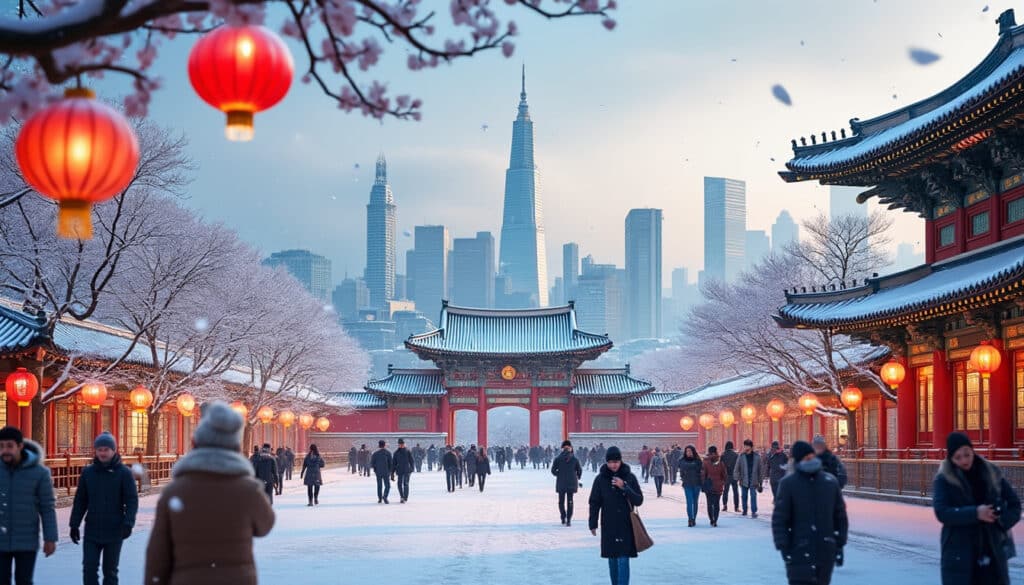
When imagining Seoul in winter, visions of snow-dusted palaces, serene parks, and bustling streets adorned in festive decorations might come to mind. But does it truly snow in Seoul? While South Korea’s capital city does experience winter weather, it doesn’t…

Flooding and natural risks in Seoul
Seoul, the bustling heart of Korea, is not without its challenges. As the city juggles rapid urbanization and meteoric technological advances, it also faces the formidable threats of flooding and other natural risks. Dubbed as one of the “Mega Cities”,…
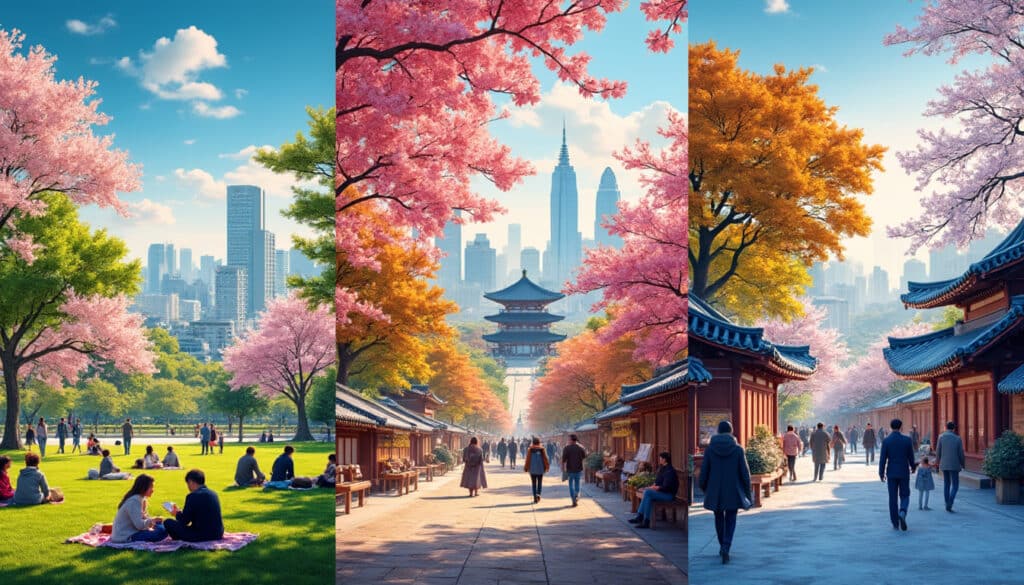
Is Seoul warm throughout the year?
Seoul, the dynamic capital of South Korea, is known for its rich culture and vibrant cityscape. Yet, it also presents a diverse climate that varies significantly across the year. Understanding Seoul’s weather patterns is essential for prospective travelers, businesses like…
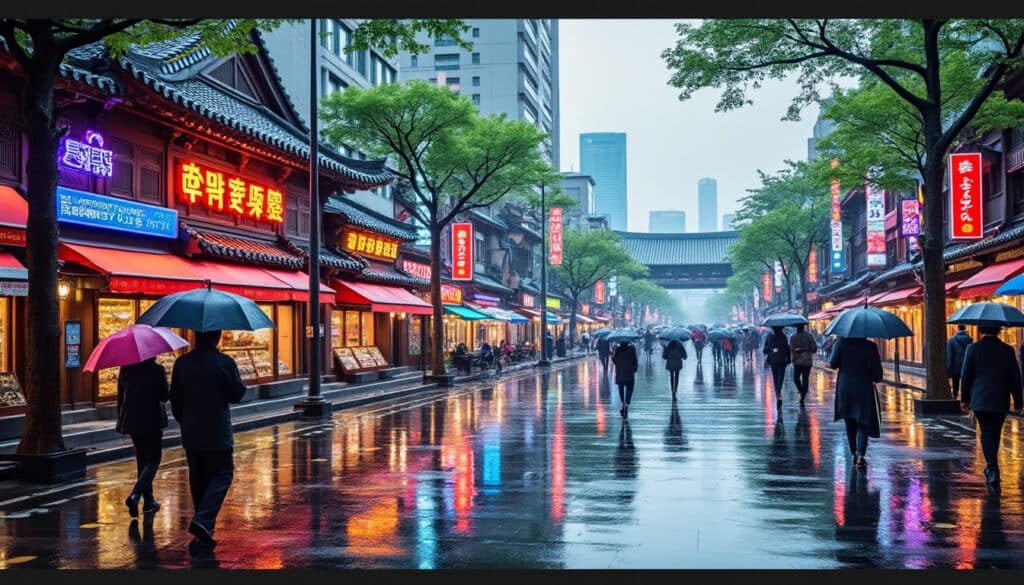
Rain and precipitation in Seoul
Seoul, the bustling heart of South Korea, is a city that experiences a wide array of weather patterns throughout the year. Its unique climate is characterized by hot, humid summers and cold, dry winters, influenced by its geographical location and…

Seoul, the vibrant capital of South Korea, presents a captivating blend of ancient traditions and bustling modernity. In this city where time seems to stand still and rush forward simultaneously, experiencing the beginning of a new day at sunrise is…
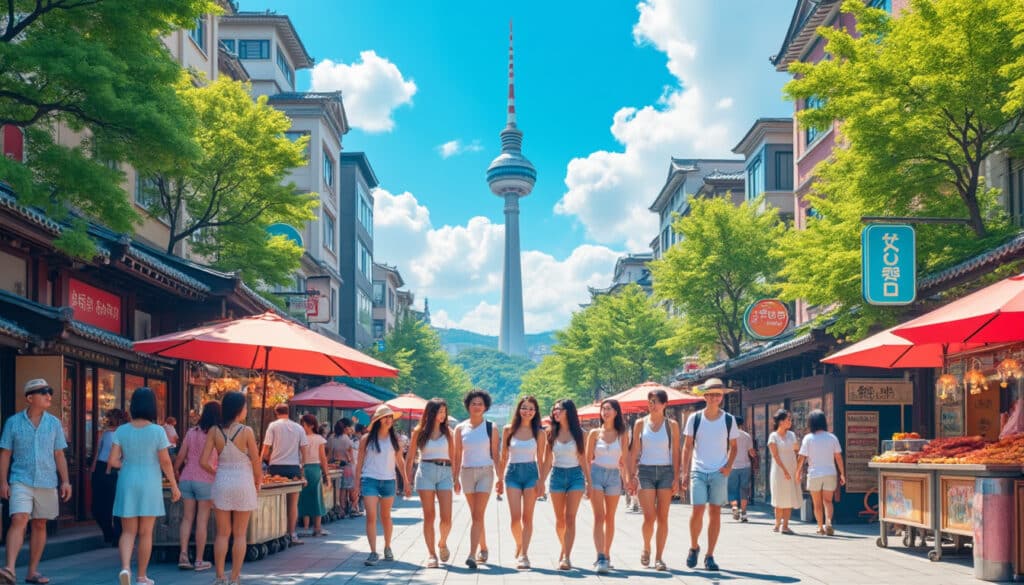
As the vibrant cityscape of Seoul continues to captivate travelers and residents alike, understanding its temperature trends becomes essential for planning visits and daily activities. The city, known for its unique blend of tradition and modernity, offers a distinct climate…
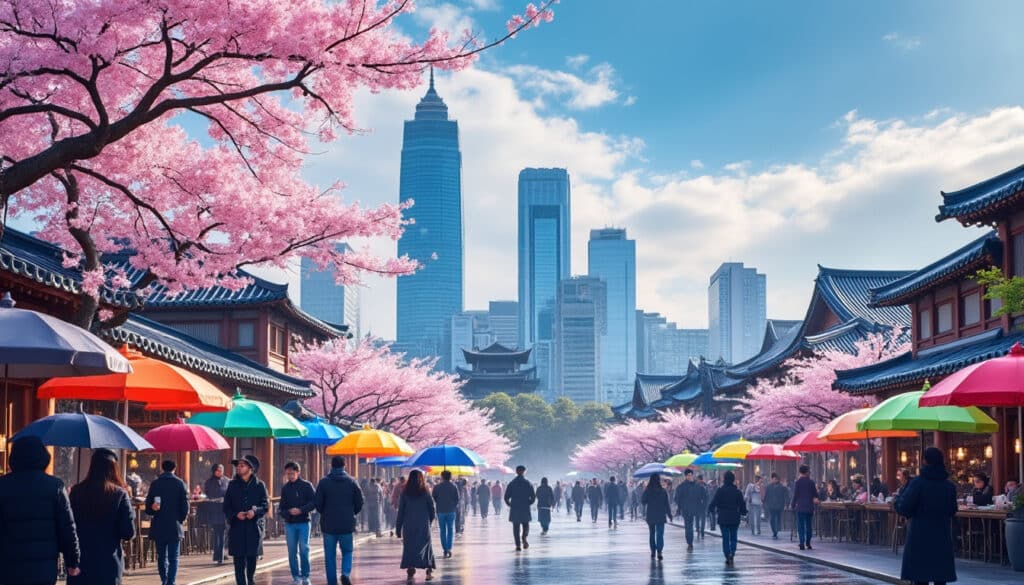
What is the weather like in Seoul?
Seoul, a bustling metropolis with a perfect blend of ancient traditions and modern innovations, often leaves its visitors and residents curious about its weather patterns. While the city is famous for its historic palaces, cutting-edge technology, and mouth-watering cuisine, understanding…
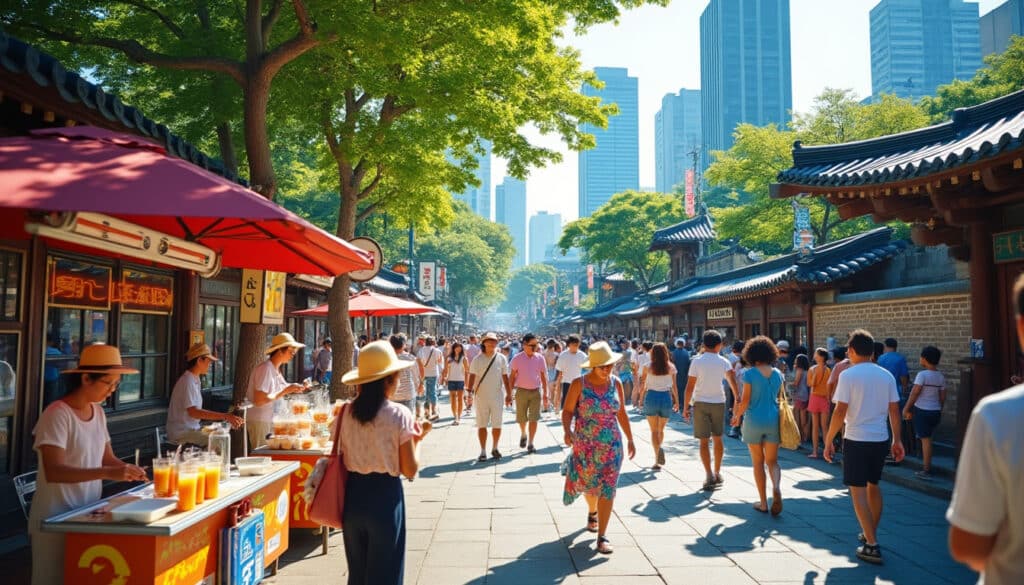
Seoul, a vibrant city known for its mix of traditional culture and modern innovation, transforms under the blazing summer sun. With its hot and humid climate, Seoul during summer is a true testament to the concept of endurance and adaptation.…

